Business Law Module - Law of Negligence
VerifiedAdded on 2020/12/29
|24
|1567
|134
Homework Assignment
AI Summary
This assignment provides an overview of the law of negligence in business, covering its definition, types, and key legal principles. It examines the landmark case of Donoghue v Stevenson, establishing the duty of care in tort law, and explores professional negligence, white-collar crimes, and corporate crimes.
Contribute Materials
Your contribution can guide someone’s learning journey. Share your
documents today.
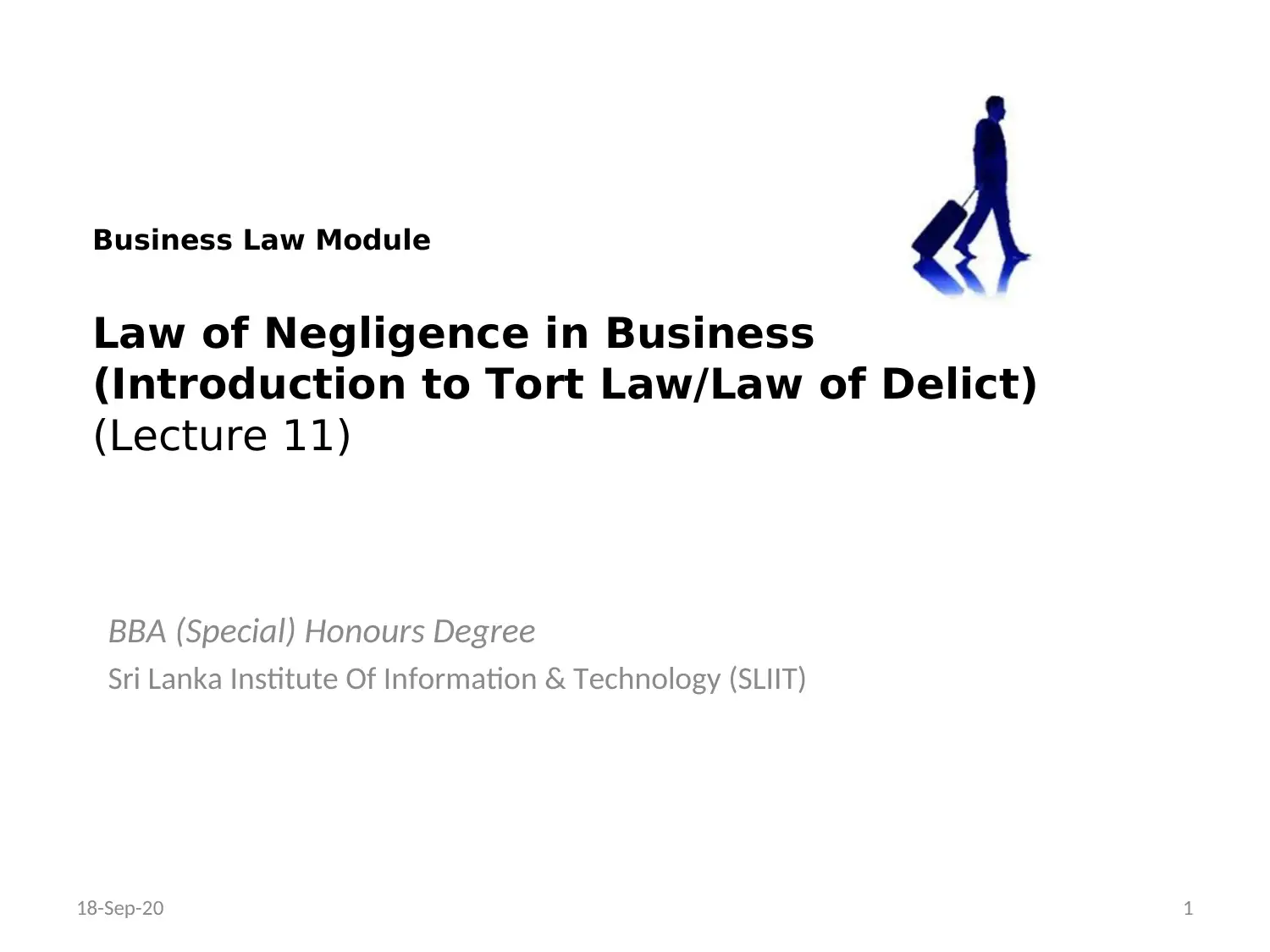
Business Law Module
Law of Negligence in Business
(Introduction to Tort Law/Law of Delict)
(Lecture 11)
BBA (Special) Honours Degree
Sri Lanka Institute Of Information & Technology (SLIIT)
18-Sep-20 1
Law of Negligence in Business
(Introduction to Tort Law/Law of Delict)
(Lecture 11)
BBA (Special) Honours Degree
Sri Lanka Institute Of Information & Technology (SLIIT)
18-Sep-20 1
Secure Best Marks with AI Grader
Need help grading? Try our AI Grader for instant feedback on your assignments.
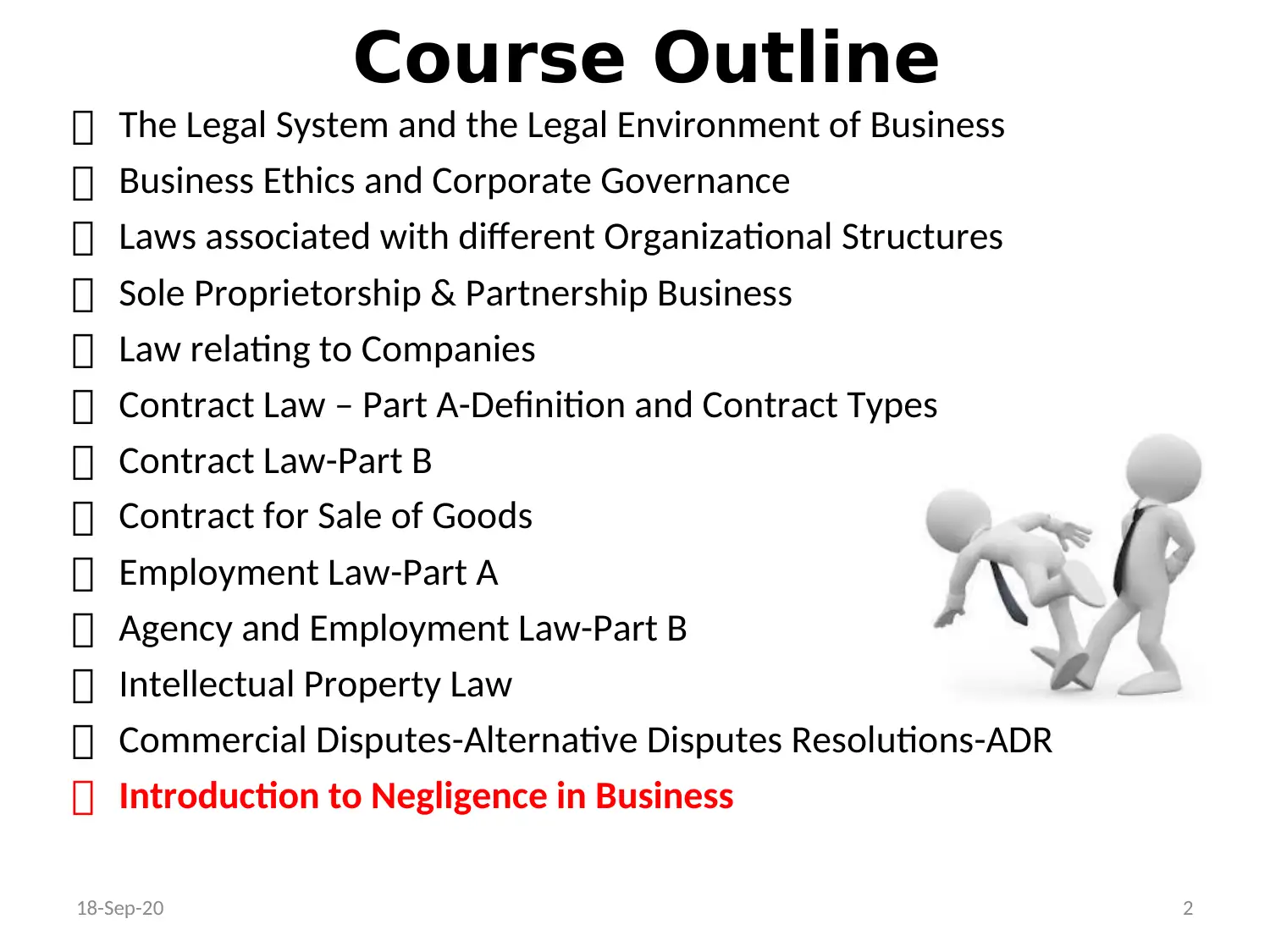
Course Outline
The Legal System and the Legal Environment of Business
Business Ethics and Corporate Governance
Laws associated with different Organizational Structures
Sole Proprietorship & Partnership Business
Law relating to Companies
Contract Law – Part A-Definition and Contract Types
Contract Law-Part B
Contract for Sale of Goods
Employment Law-Part A
Agency and Employment Law-Part B
Intellectual Property Law
Commercial Disputes-Alternative Disputes Resolutions-ADR
Introduction to Negligence in Business
18-Sep-20 2
The Legal System and the Legal Environment of Business
Business Ethics and Corporate Governance
Laws associated with different Organizational Structures
Sole Proprietorship & Partnership Business
Law relating to Companies
Contract Law – Part A-Definition and Contract Types
Contract Law-Part B
Contract for Sale of Goods
Employment Law-Part A
Agency and Employment Law-Part B
Intellectual Property Law
Commercial Disputes-Alternative Disputes Resolutions-ADR
Introduction to Negligence in Business
18-Sep-20 2
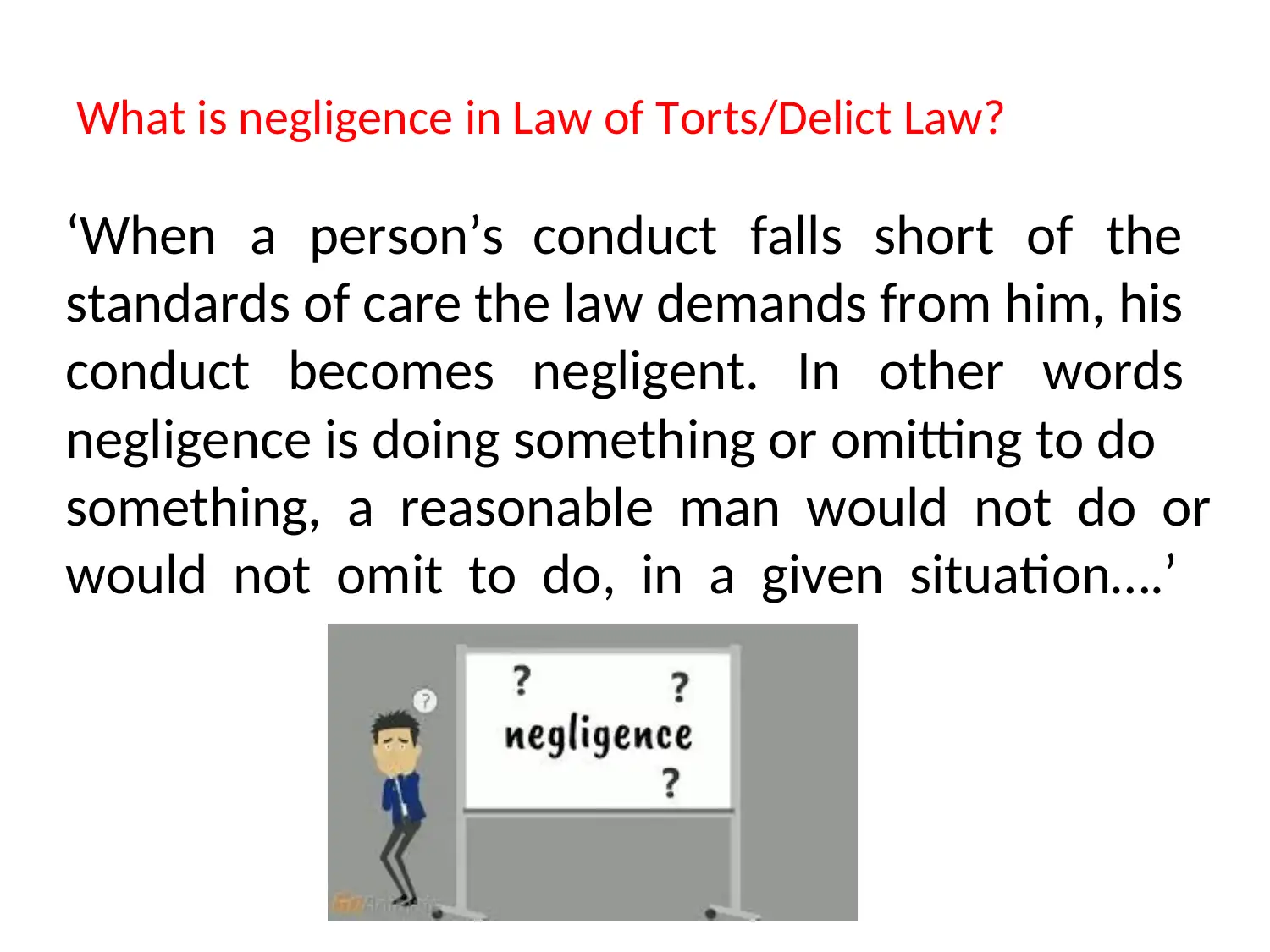
What is negligence in Law of Torts/Delict Law?
‘When a person’s conduct falls short of the
standards of care the law demands from him, his
conduct becomes negligent. In other words
negligence is doing something or omitting to do
something, a reasonable man would not do or
would not omit to do, in a given situation….’
‘When a person’s conduct falls short of the
standards of care the law demands from him, his
conduct becomes negligent. In other words
negligence is doing something or omitting to do
something, a reasonable man would not do or
would not omit to do, in a given situation….’
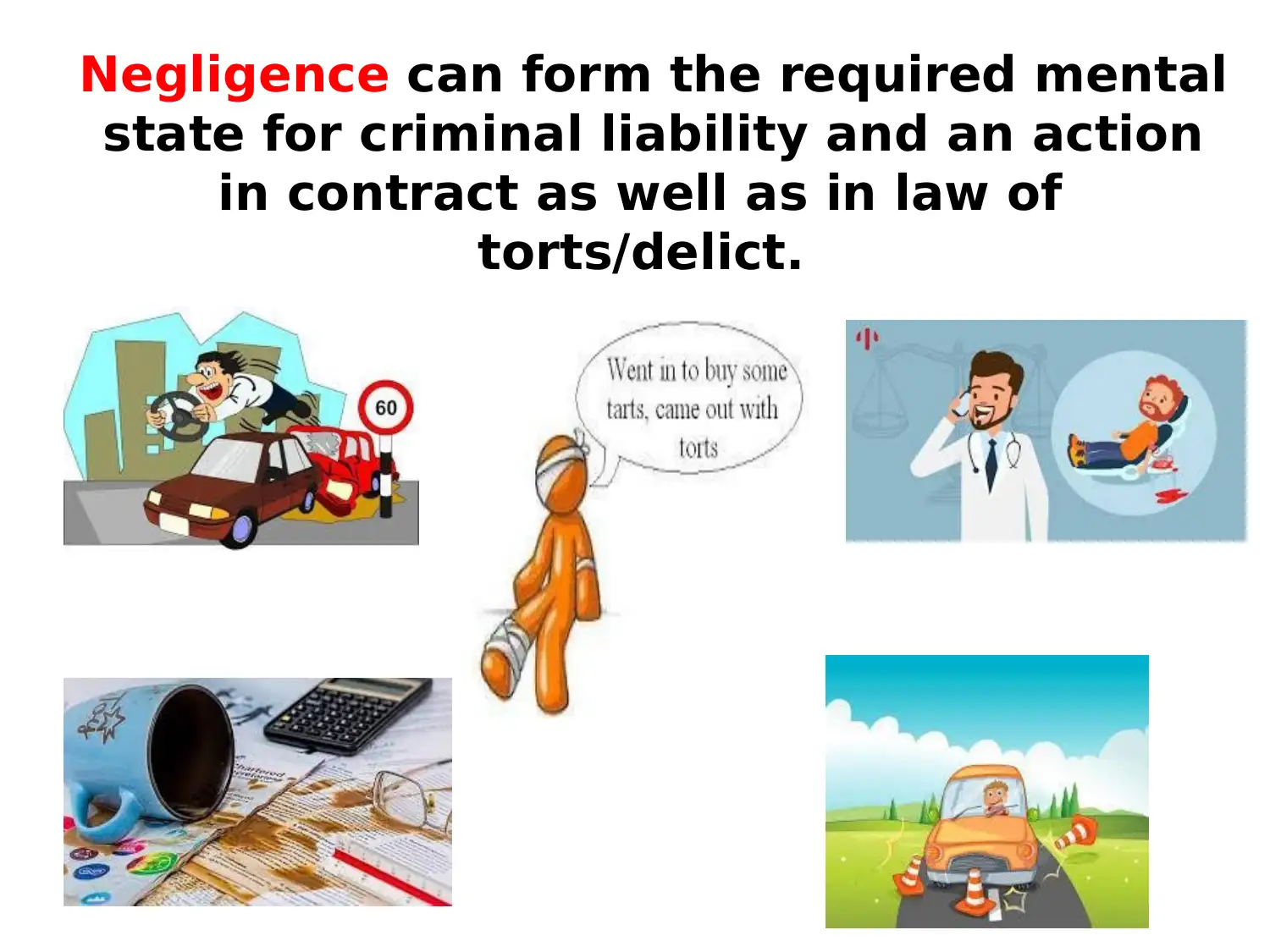
Negligence can form the required mental
state for criminal liability and an action
in contract as well as in law of
torts/delict.
state for criminal liability and an action
in contract as well as in law of
torts/delict.
Secure Best Marks with AI Grader
Need help grading? Try our AI Grader for instant feedback on your assignments.
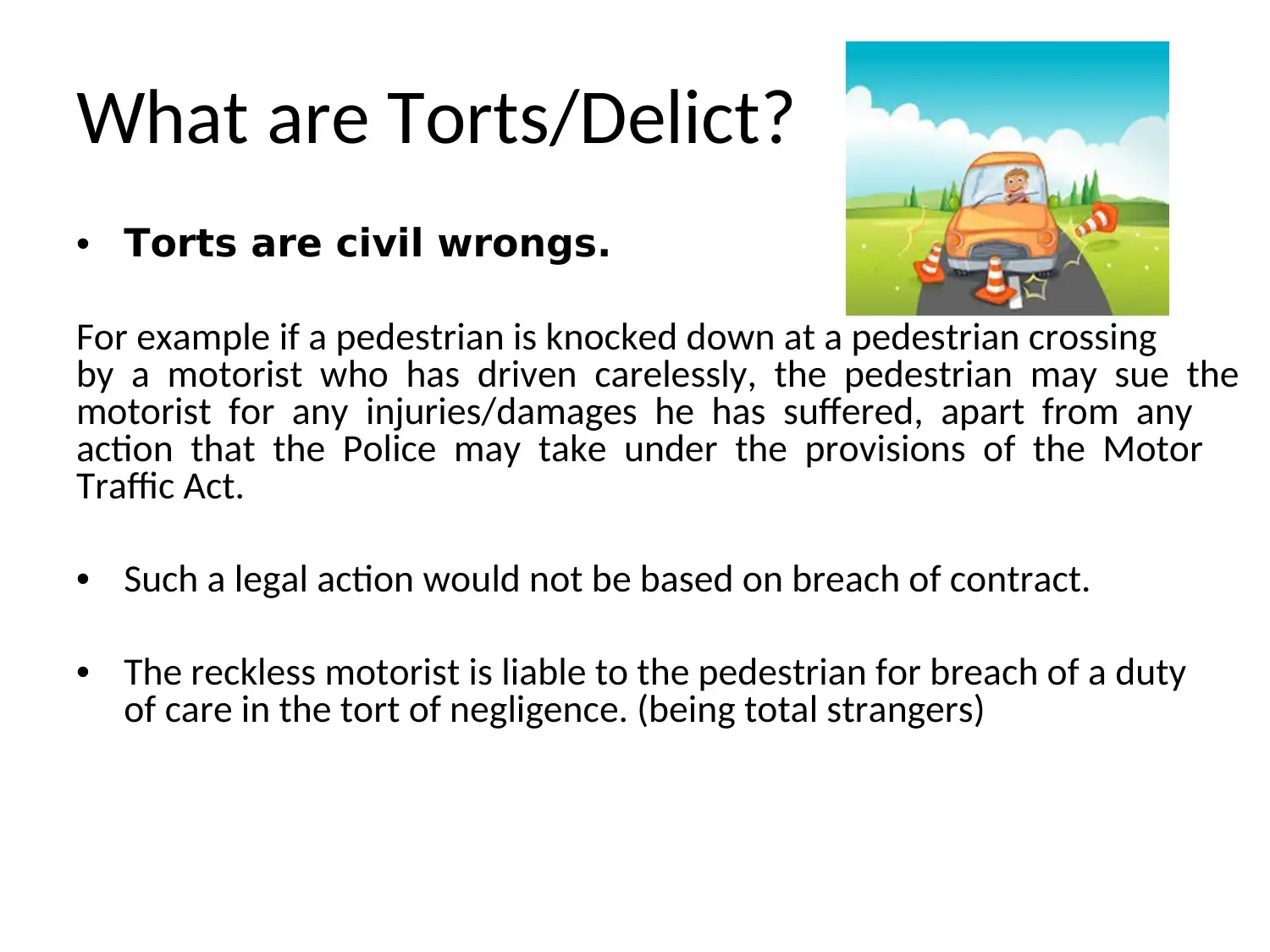
What are Torts/Delict?
• Torts are civil wrongs.
For example if a pedestrian is knocked down at a pedestrian crossing
by a motorist who has driven carelessly, the pedestrian may sue the
motorist for any injuries/damages he has suffered, apart from any
action that the Police may take under the provisions of the Motor
Traffic Act.
• Such a legal action would not be based on breach of contract.
• The reckless motorist is liable to the pedestrian for breach of a duty
of care in the tort of negligence. (being total strangers)
• Torts are civil wrongs.
For example if a pedestrian is knocked down at a pedestrian crossing
by a motorist who has driven carelessly, the pedestrian may sue the
motorist for any injuries/damages he has suffered, apart from any
action that the Police may take under the provisions of the Motor
Traffic Act.
• Such a legal action would not be based on breach of contract.
• The reckless motorist is liable to the pedestrian for breach of a duty
of care in the tort of negligence. (being total strangers)
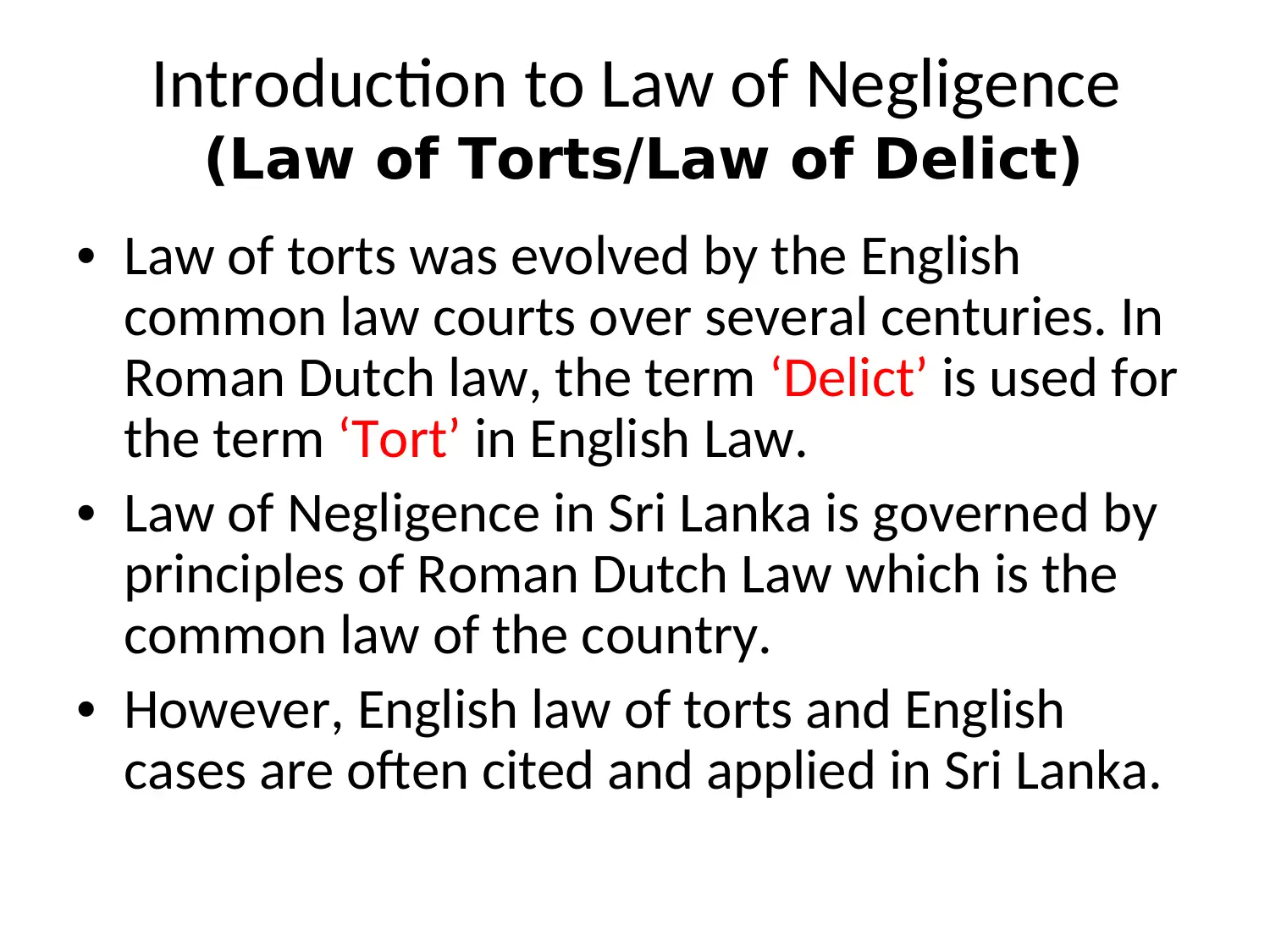
Introduction to Law of Negligence
(Law of Torts/Law of Delict)
• Law of torts was evolved by the English
common law courts over several centuries. In
Roman Dutch law, the term ‘Delict’ is used for
the term ‘Tort’ in English Law.
• Law of Negligence in Sri Lanka is governed by
principles of Roman Dutch Law which is the
common law of the country.
• However, English law of torts and English
cases are often cited and applied in Sri Lanka.
(Law of Torts/Law of Delict)
• Law of torts was evolved by the English
common law courts over several centuries. In
Roman Dutch law, the term ‘Delict’ is used for
the term ‘Tort’ in English Law.
• Law of Negligence in Sri Lanka is governed by
principles of Roman Dutch Law which is the
common law of the country.
• However, English law of torts and English
cases are often cited and applied in Sri Lanka.
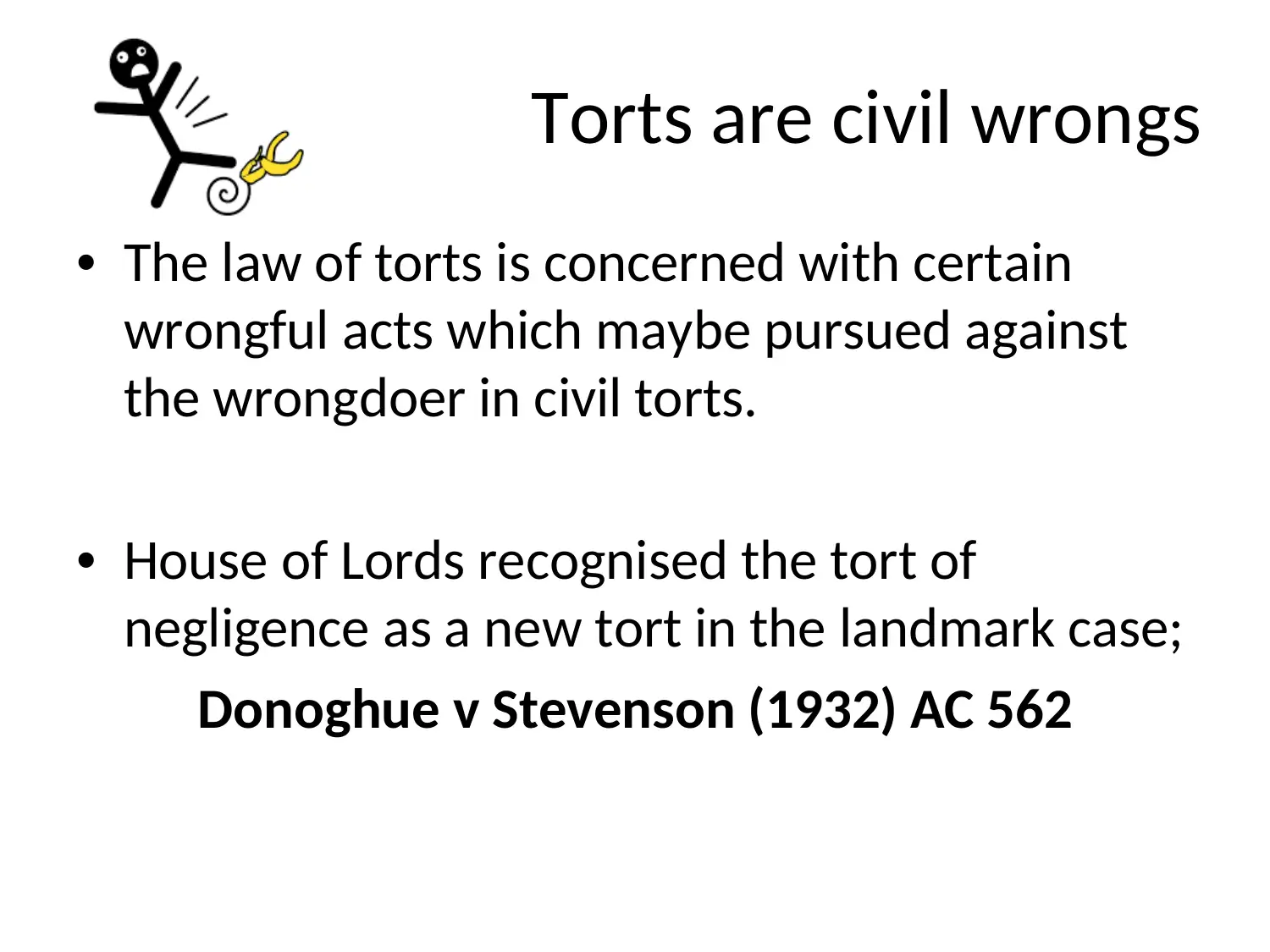
Torts are civil wrongs
• The law of torts is concerned with certain
wrongful acts which maybe pursued against
the wrongdoer in civil torts.
• House of Lords recognised the tort of
negligence as a new tort in the landmark case;
Donoghue v Stevenson (1932) AC 562
• The law of torts is concerned with certain
wrongful acts which maybe pursued against
the wrongdoer in civil torts.
• House of Lords recognised the tort of
negligence as a new tort in the landmark case;
Donoghue v Stevenson (1932) AC 562
Paraphrase This Document
Need a fresh take? Get an instant paraphrase of this document with our AI Paraphraser
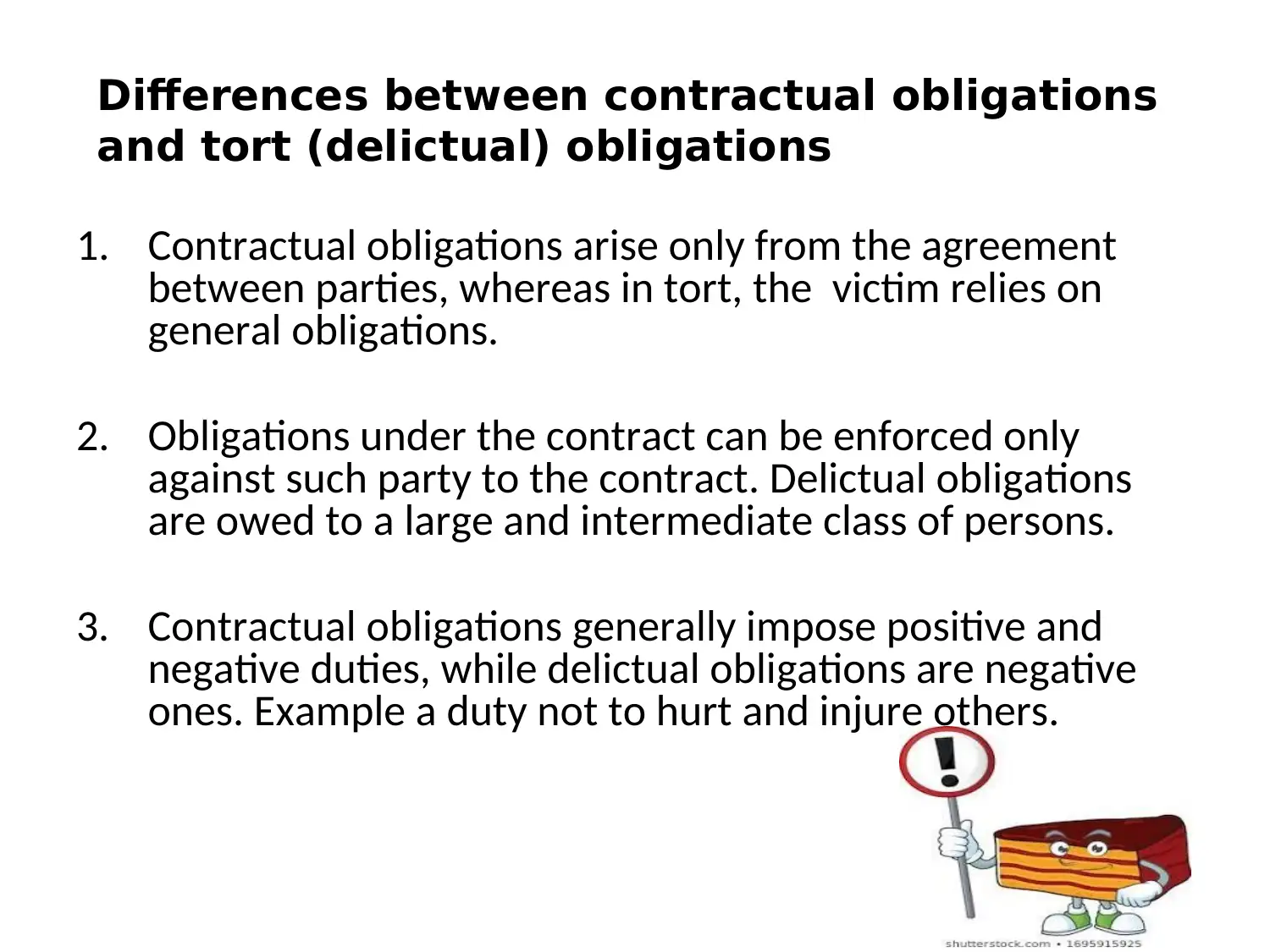
Differences between contractual obligations
and tort (delictual) obligations
1. Contractual obligations arise only from the agreement
between parties, whereas in tort, the victim relies on
general obligations.
2. Obligations under the contract can be enforced only
against such party to the contract. Delictual obligations
are owed to a large and intermediate class of persons.
3. Contractual obligations generally impose positive and
negative duties, while delictual obligations are negative
ones. Example a duty not to hurt and injure others.
and tort (delictual) obligations
1. Contractual obligations arise only from the agreement
between parties, whereas in tort, the victim relies on
general obligations.
2. Obligations under the contract can be enforced only
against such party to the contract. Delictual obligations
are owed to a large and intermediate class of persons.
3. Contractual obligations generally impose positive and
negative duties, while delictual obligations are negative
ones. Example a duty not to hurt and injure others.
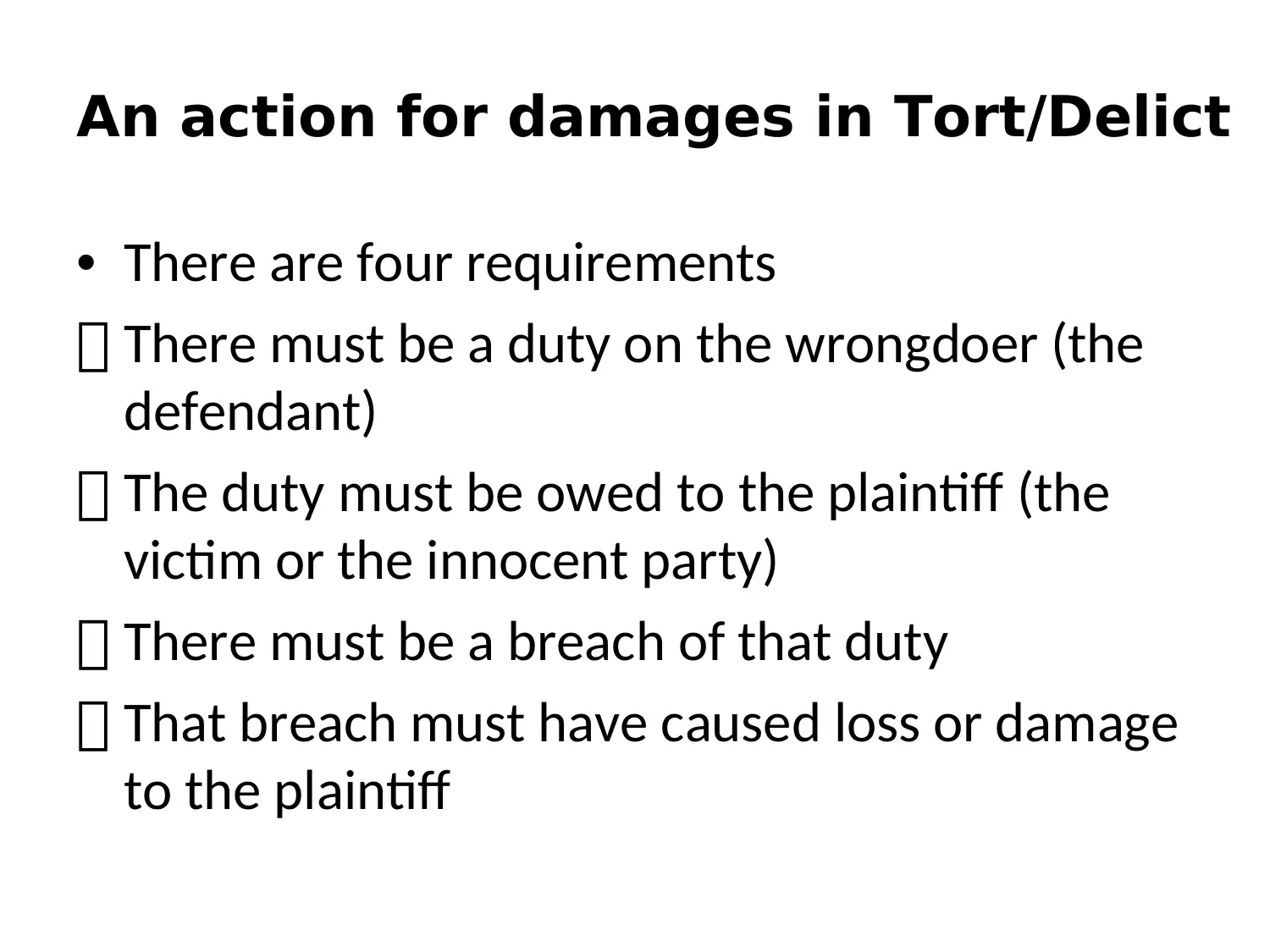
An action for damages in Tort/Delict
• There are four requirements
There must be a duty on the wrongdoer (the
defendant)
The duty must be owed to the plaintiff (the
victim or the innocent party)
There must be a breach of that duty
That breach must have caused loss or damage
to the plaintiff
• There are four requirements
There must be a duty on the wrongdoer (the
defendant)
The duty must be owed to the plaintiff (the
victim or the innocent party)
There must be a breach of that duty
That breach must have caused loss or damage
to the plaintiff
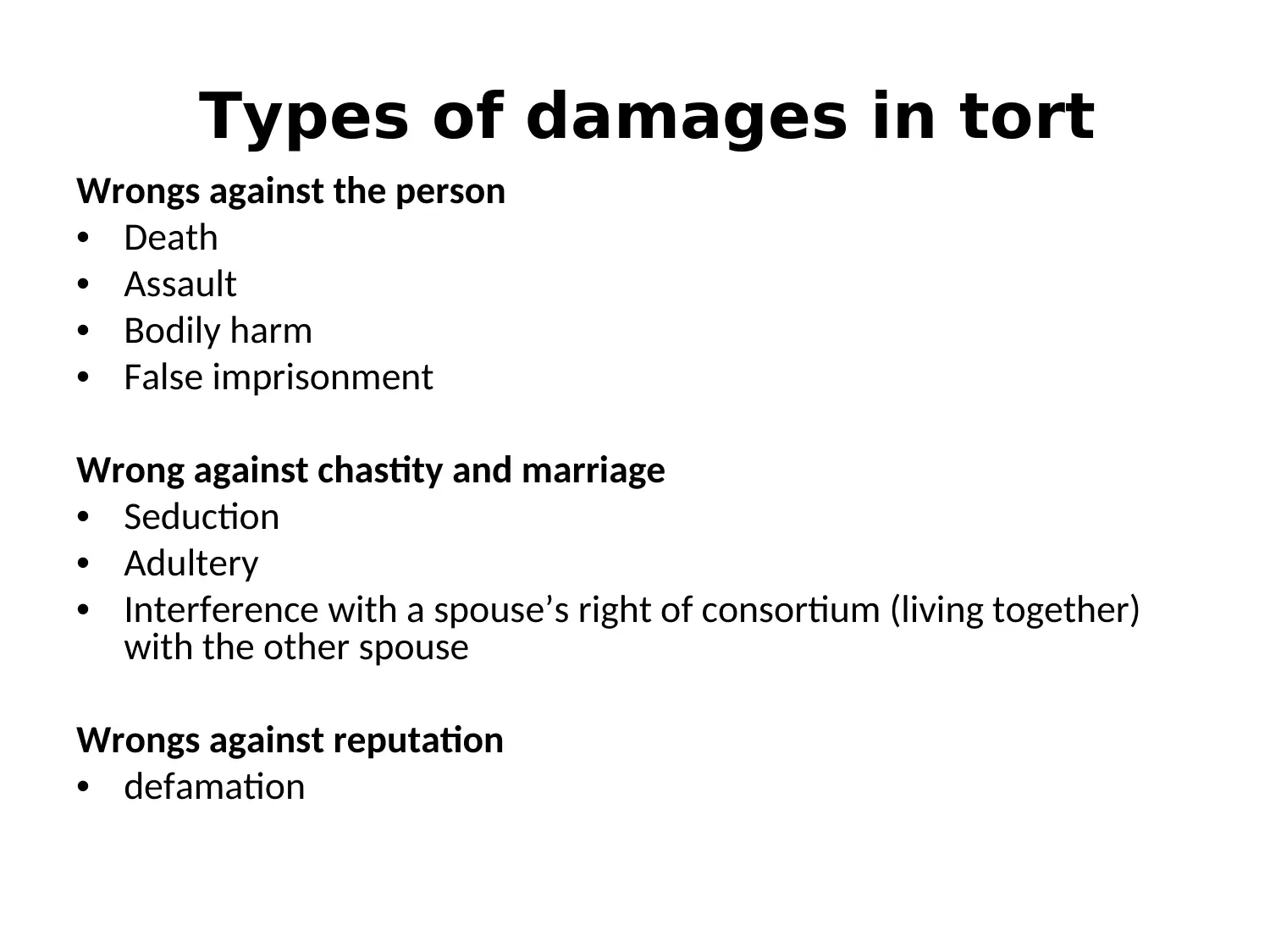
Types of damages in tort
Wrongs against the person
• Death
• Assault
• Bodily harm
• False imprisonment
Wrong against chastity and marriage
• Seduction
• Adultery
• Interference with a spouse’s right of consortium (living together)
with the other spouse
Wrongs against reputation
• defamation
Wrongs against the person
• Death
• Assault
• Bodily harm
• False imprisonment
Wrong against chastity and marriage
• Seduction
• Adultery
• Interference with a spouse’s right of consortium (living together)
with the other spouse
Wrongs against reputation
• defamation
Secure Best Marks with AI Grader
Need help grading? Try our AI Grader for instant feedback on your assignments.
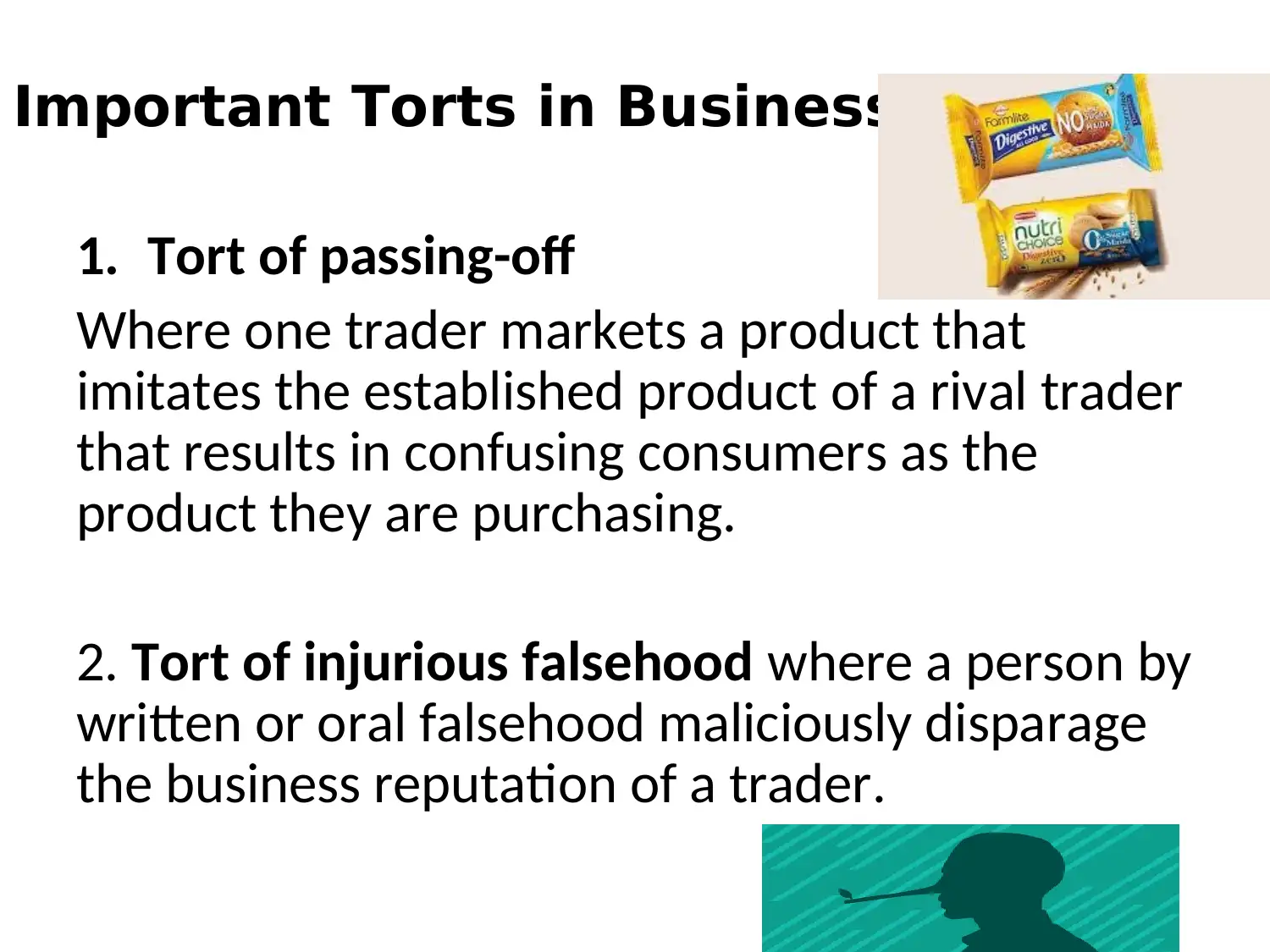
Important Torts in Business Law
1. Tort of passing-off
Where one trader markets a product that
imitates the established product of a rival trader
that results in confusing consumers as the
product they are purchasing.
2. Tort of injurious falsehood where a person by
written or oral falsehood maliciously disparage
the business reputation of a trader.
1. Tort of passing-off
Where one trader markets a product that
imitates the established product of a rival trader
that results in confusing consumers as the
product they are purchasing.
2. Tort of injurious falsehood where a person by
written or oral falsehood maliciously disparage
the business reputation of a trader.
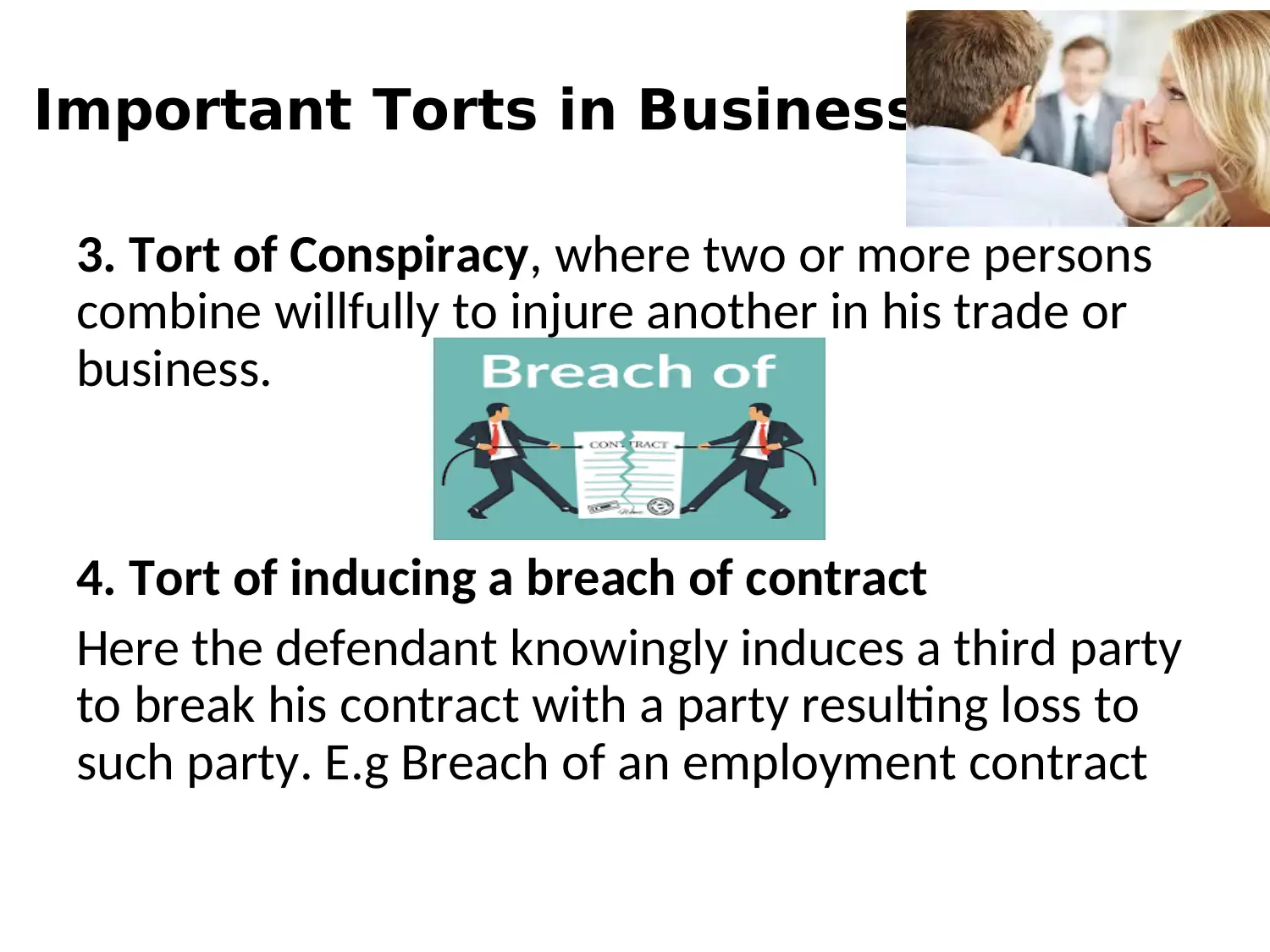
Important Torts in Business Law..
3. Tort of Conspiracy, where two or more persons
combine willfully to injure another in his trade or
business.
4. Tort of inducing a breach of contract
Here the defendant knowingly induces a third party
to break his contract with a party resulting loss to
such party. E.g Breach of an employment contract
3. Tort of Conspiracy, where two or more persons
combine willfully to injure another in his trade or
business.
4. Tort of inducing a breach of contract
Here the defendant knowingly induces a third party
to break his contract with a party resulting loss to
such party. E.g Breach of an employment contract
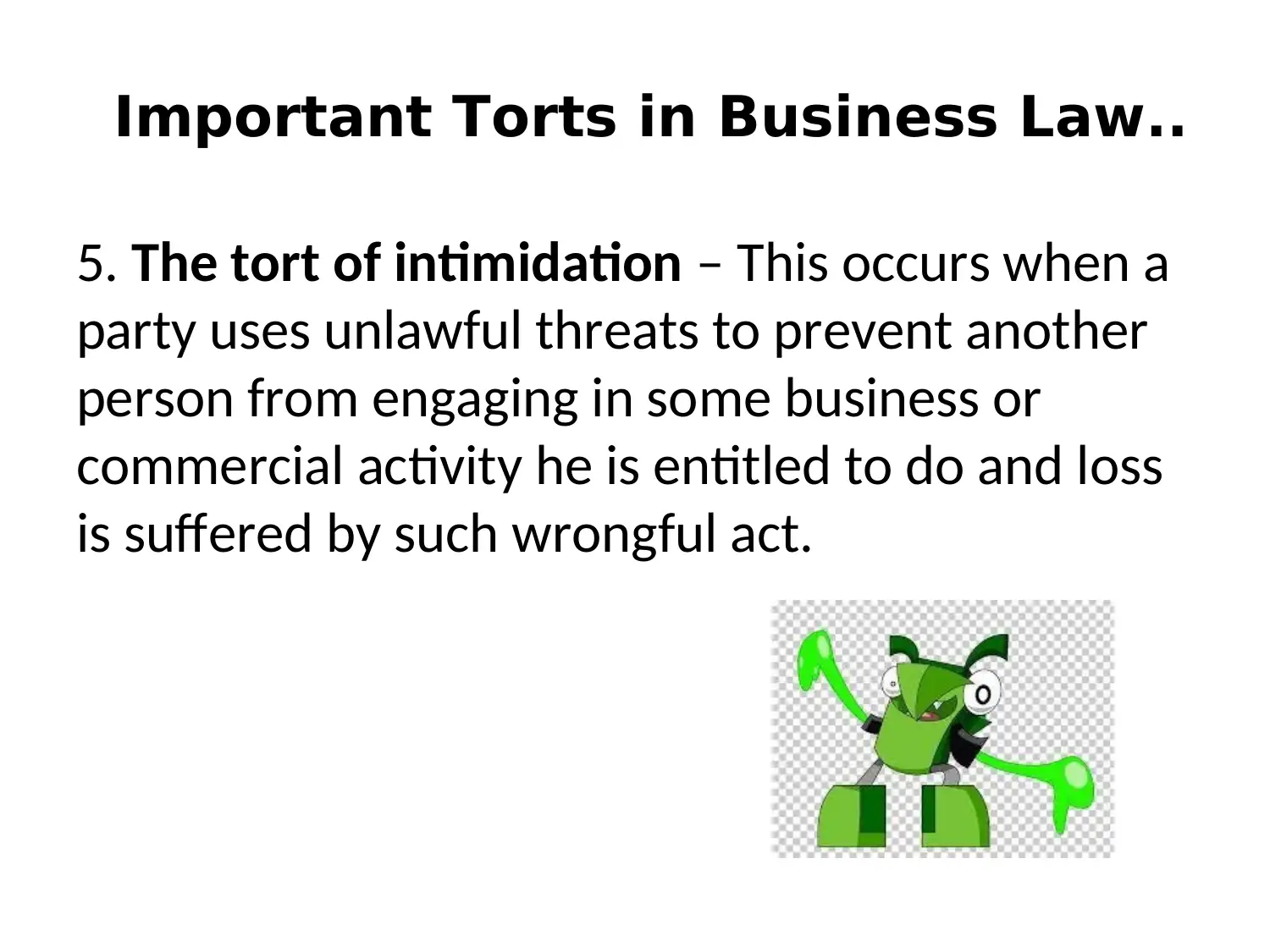
Important Torts in Business Law..
5. The tort of intimidation – This occurs when a
party uses unlawful threats to prevent another
person from engaging in some business or
commercial activity he is entitled to do and loss
is suffered by such wrongful act.
5. The tort of intimidation – This occurs when a
party uses unlawful threats to prevent another
person from engaging in some business or
commercial activity he is entitled to do and loss
is suffered by such wrongful act.
Paraphrase This Document
Need a fresh take? Get an instant paraphrase of this document with our AI Paraphraser
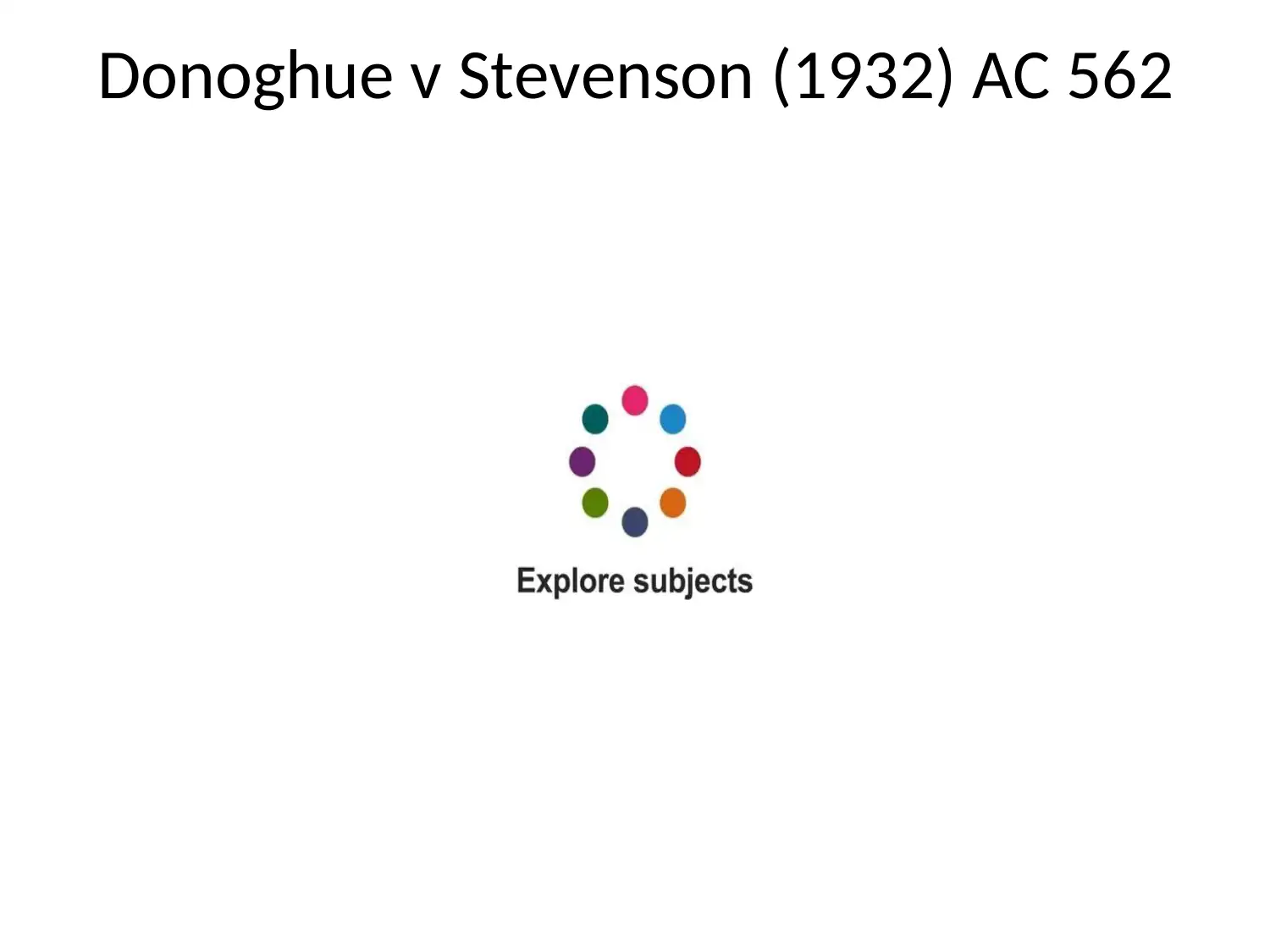
Donoghue v Stevenson (1932) AC 562
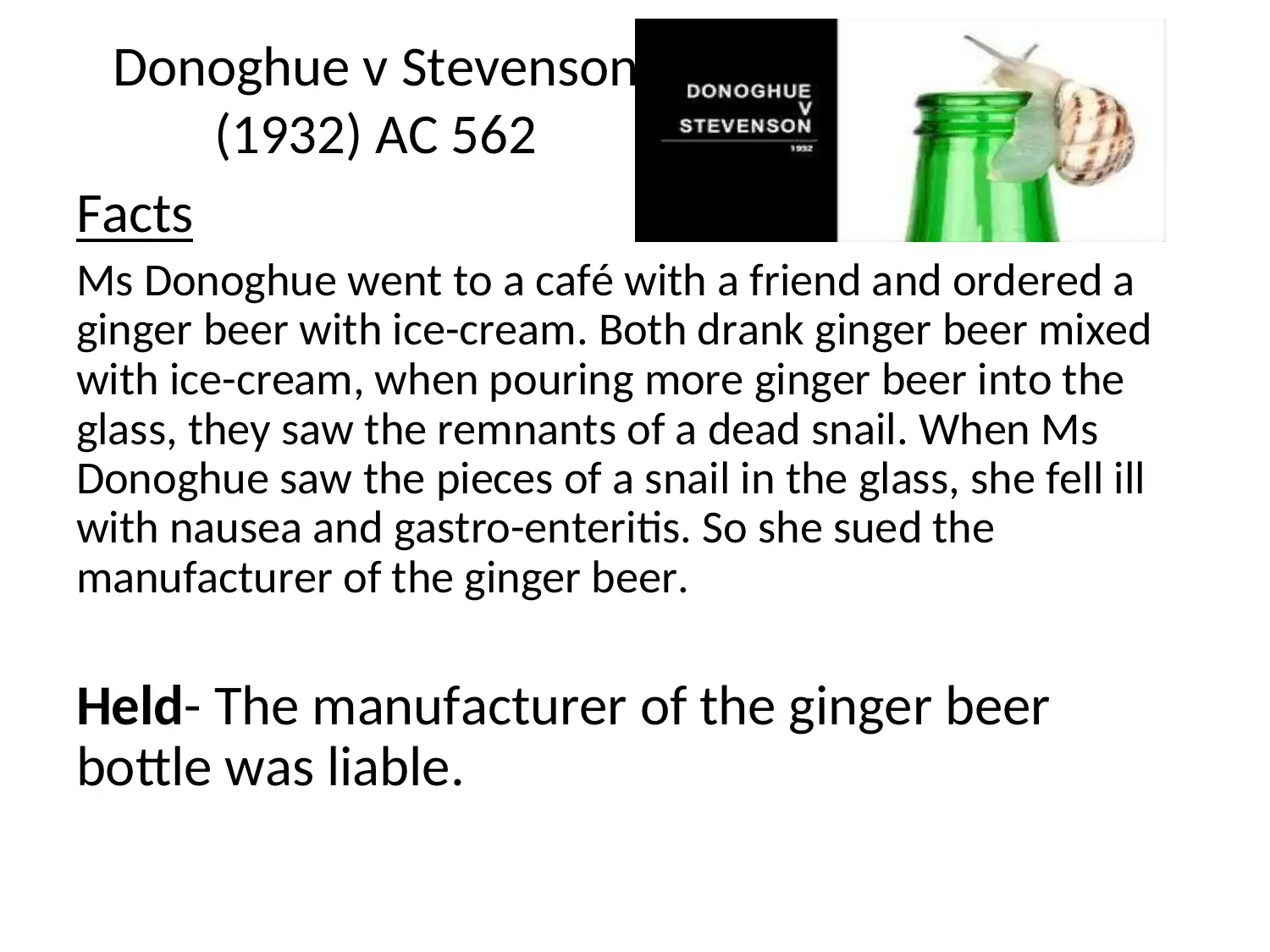
Donoghue v Stevenson
(1932) AC 562
Facts
Ms Donoghue went to a café with a friend and ordered a
ginger beer with ice-cream. Both drank ginger beer mixed
with ice-cream, when pouring more ginger beer into the
glass, they saw the remnants of a dead snail. When Ms
Donoghue saw the pieces of a snail in the glass, she fell ill
with nausea and gastro-enteritis. So she sued the
manufacturer of the ginger beer.
Held- The manufacturer of the ginger beer
bottle was liable.
(1932) AC 562
Facts
Ms Donoghue went to a café with a friend and ordered a
ginger beer with ice-cream. Both drank ginger beer mixed
with ice-cream, when pouring more ginger beer into the
glass, they saw the remnants of a dead snail. When Ms
Donoghue saw the pieces of a snail in the glass, she fell ill
with nausea and gastro-enteritis. So she sued the
manufacturer of the ginger beer.
Held- The manufacturer of the ginger beer
bottle was liable.
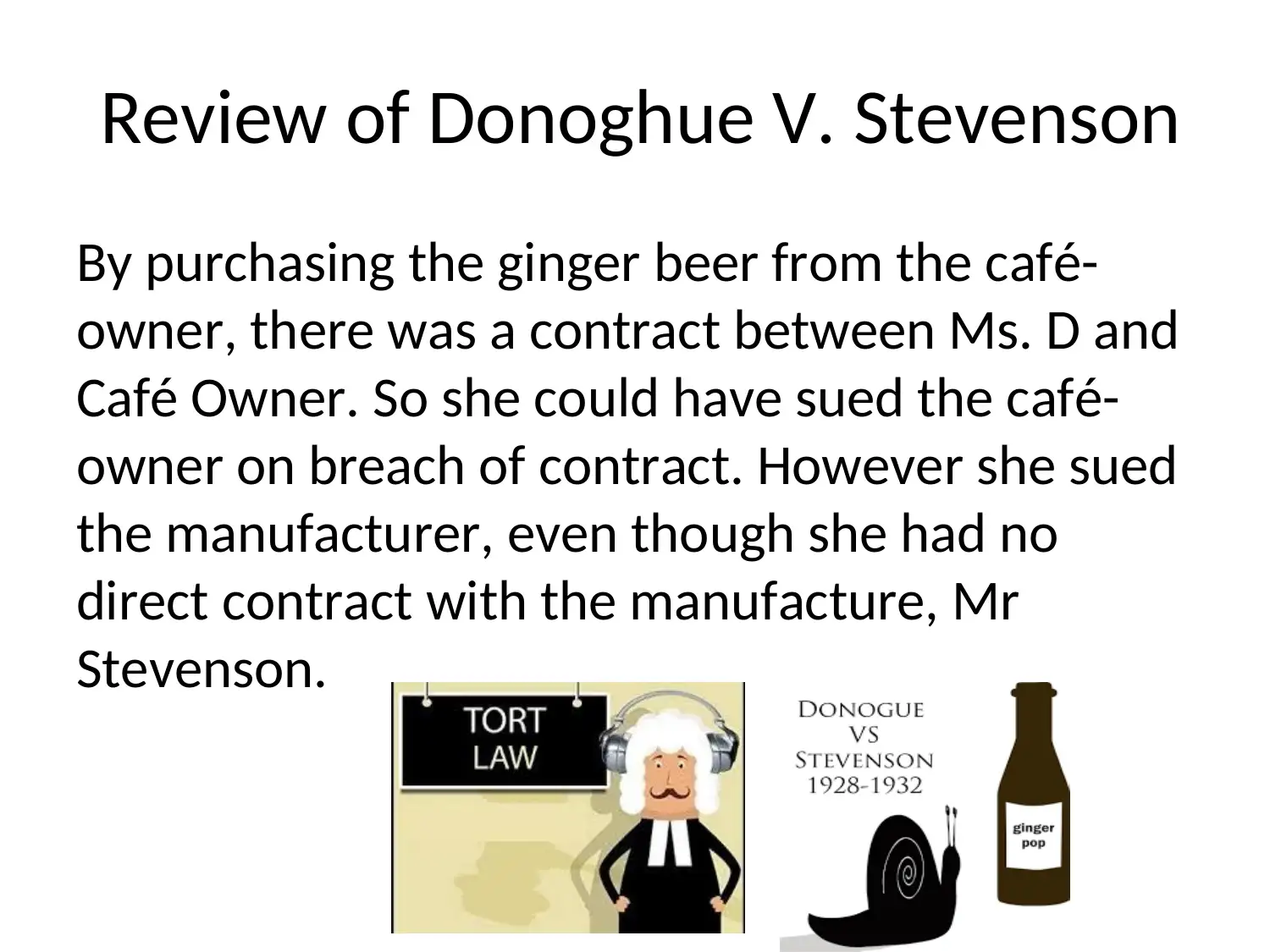
Review of Donoghue V. Stevenson
By purchasing the ginger beer from the café-
owner, there was a contract between Ms. D and
Café Owner. So she could have sued the café-
owner on breach of contract. However she sued
the manufacturer, even though she had no
direct contract with the manufacture, Mr
Stevenson.
By purchasing the ginger beer from the café-
owner, there was a contract between Ms. D and
Café Owner. So she could have sued the café-
owner on breach of contract. However she sued
the manufacturer, even though she had no
direct contract with the manufacture, Mr
Stevenson.
Secure Best Marks with AI Grader
Need help grading? Try our AI Grader for instant feedback on your assignments.
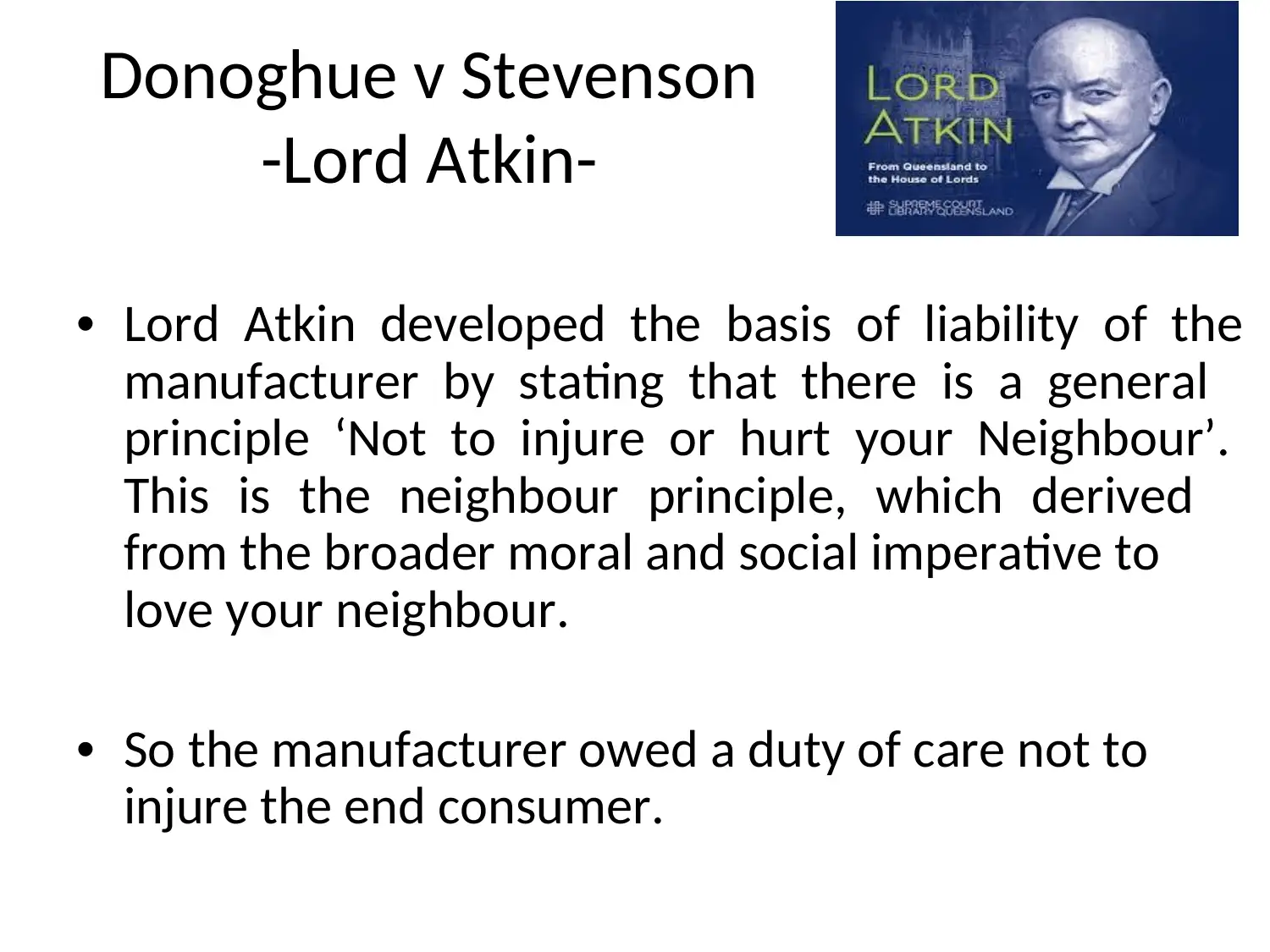
Donoghue v Stevenson
-Lord Atkin-
• Lord Atkin developed the basis of liability of the
manufacturer by stating that there is a general
principle ‘Not to injure or hurt your Neighbour’.
This is the neighbour principle, which derived
from the broader moral and social imperative to
love your neighbour.
• So the manufacturer owed a duty of care not to
injure the end consumer.
-Lord Atkin-
• Lord Atkin developed the basis of liability of the
manufacturer by stating that there is a general
principle ‘Not to injure or hurt your Neighbour’.
This is the neighbour principle, which derived
from the broader moral and social imperative to
love your neighbour.
• So the manufacturer owed a duty of care not to
injure the end consumer.
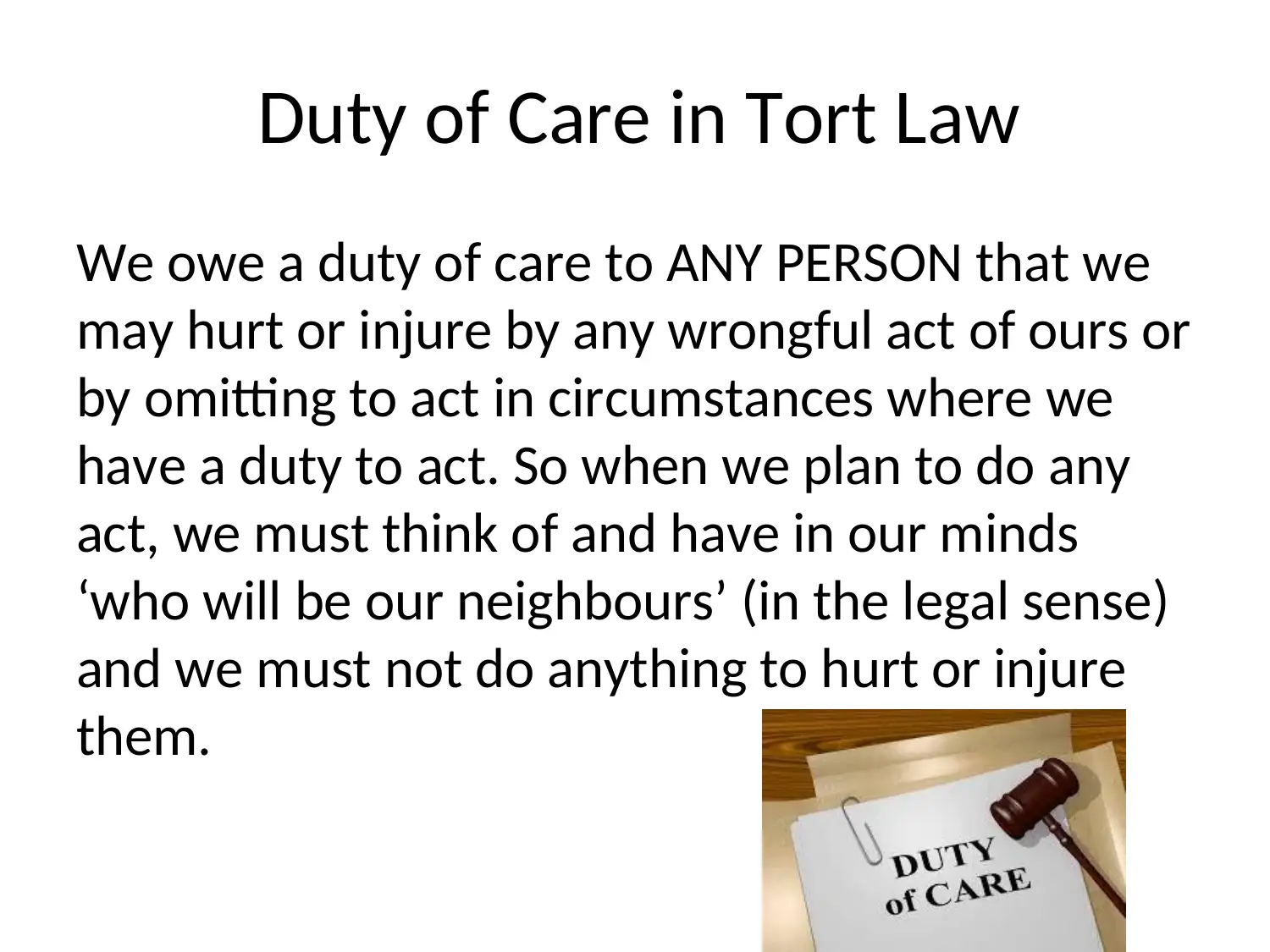
Duty of Care in Tort Law
We owe a duty of care to ANY PERSON that we
may hurt or injure by any wrongful act of ours or
by omitting to act in circumstances where we
have a duty to act. So when we plan to do any
act, we must think of and have in our minds
‘who will be our neighbours’ (in the legal sense)
and we must not do anything to hurt or injure
them.
We owe a duty of care to ANY PERSON that we
may hurt or injure by any wrongful act of ours or
by omitting to act in circumstances where we
have a duty to act. So when we plan to do any
act, we must think of and have in our minds
‘who will be our neighbours’ (in the legal sense)
and we must not do anything to hurt or injure
them.
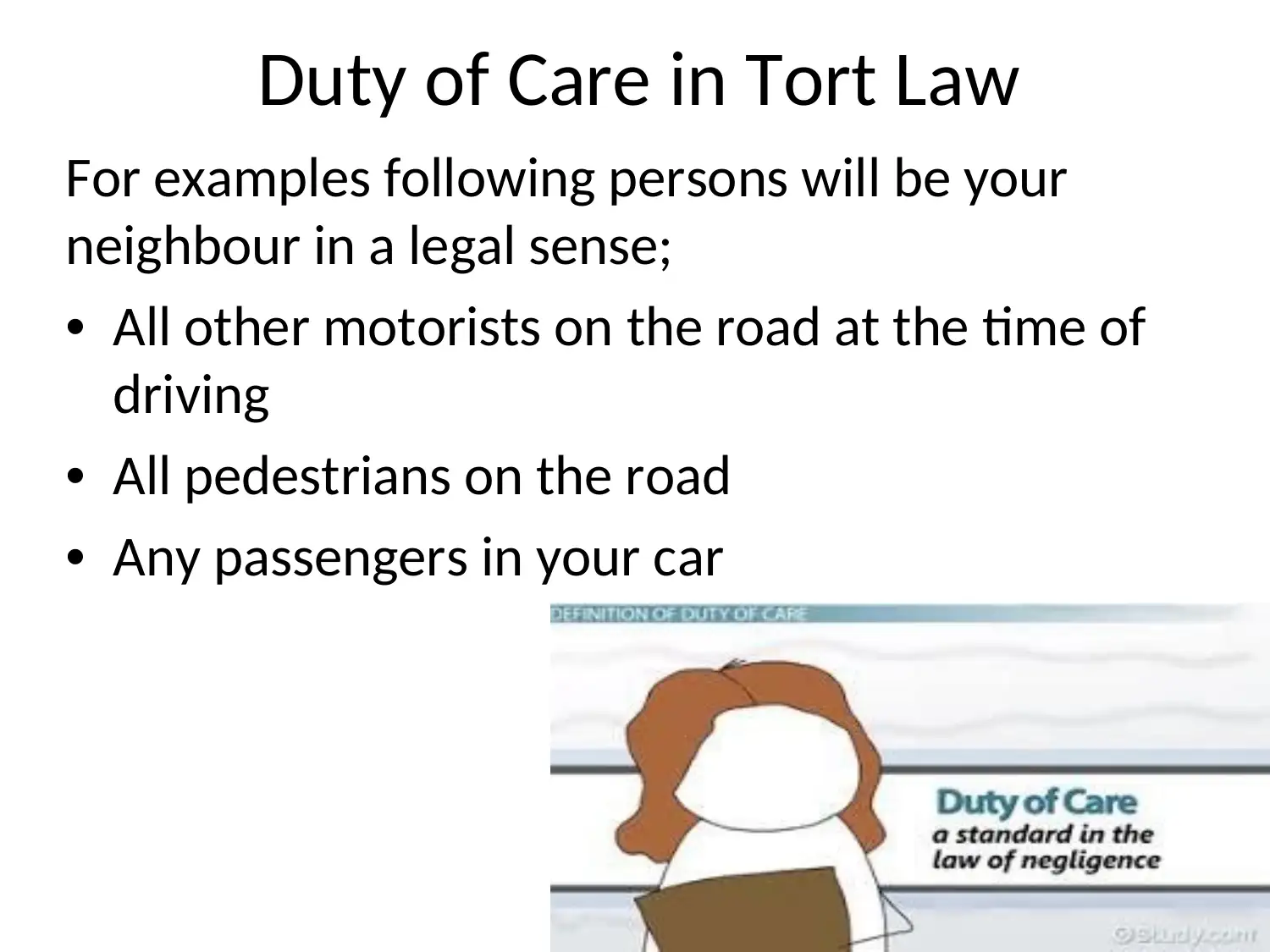
Duty of Care in Tort Law
For examples following persons will be your
neighbour in a legal sense;
• All other motorists on the road at the time of
driving
• All pedestrians on the road
• Any passengers in your car
For examples following persons will be your
neighbour in a legal sense;
• All other motorists on the road at the time of
driving
• All pedestrians on the road
• Any passengers in your car
Paraphrase This Document
Need a fresh take? Get an instant paraphrase of this document with our AI Paraphraser
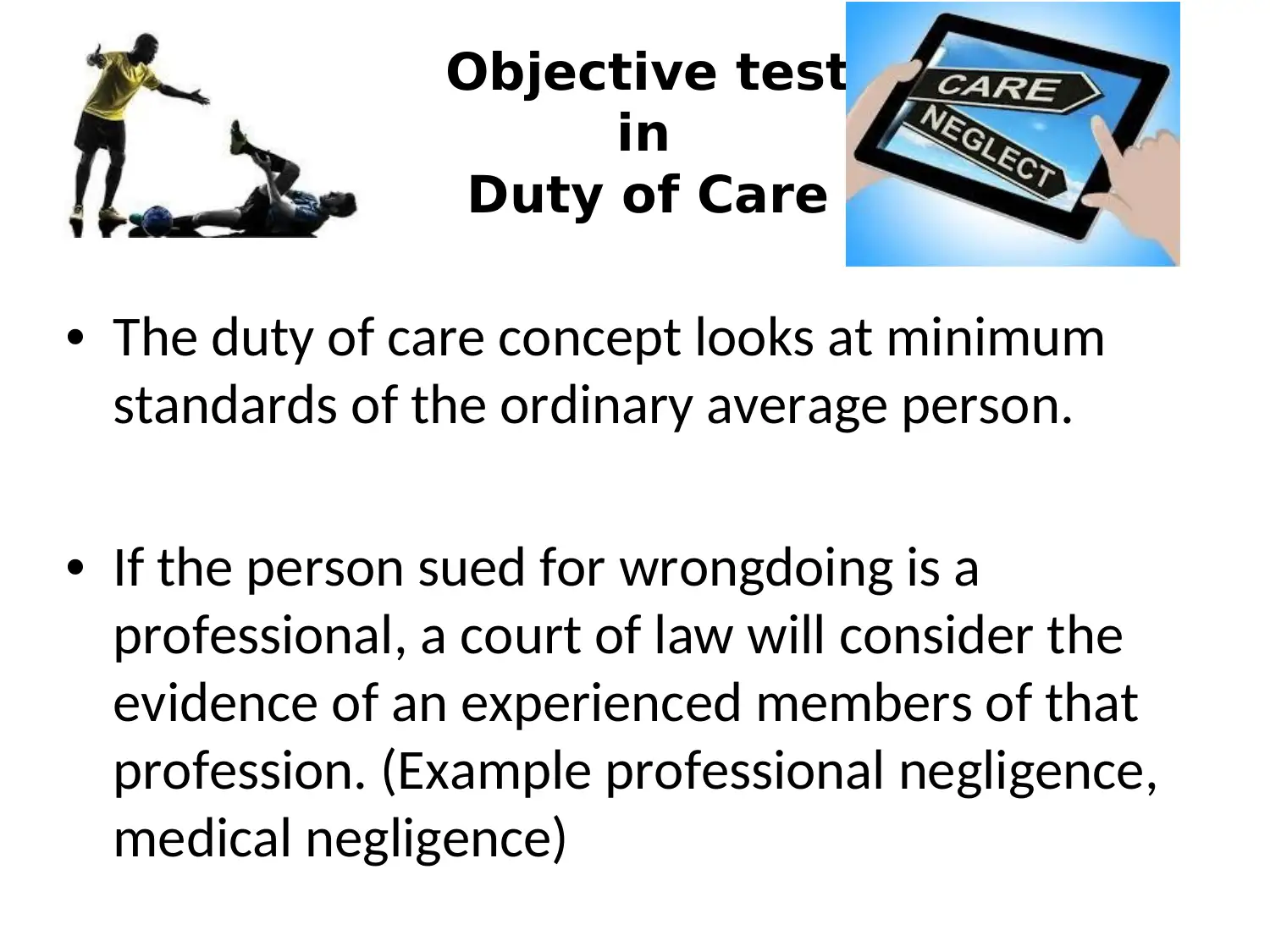
Objective test
in
Duty of Care
• The duty of care concept looks at minimum
standards of the ordinary average person.
• If the person sued for wrongdoing is a
professional, a court of law will consider the
evidence of an experienced members of that
profession. (Example professional negligence,
medical negligence)
in
Duty of Care
• The duty of care concept looks at minimum
standards of the ordinary average person.
• If the person sued for wrongdoing is a
professional, a court of law will consider the
evidence of an experienced members of that
profession. (Example professional negligence,
medical negligence)
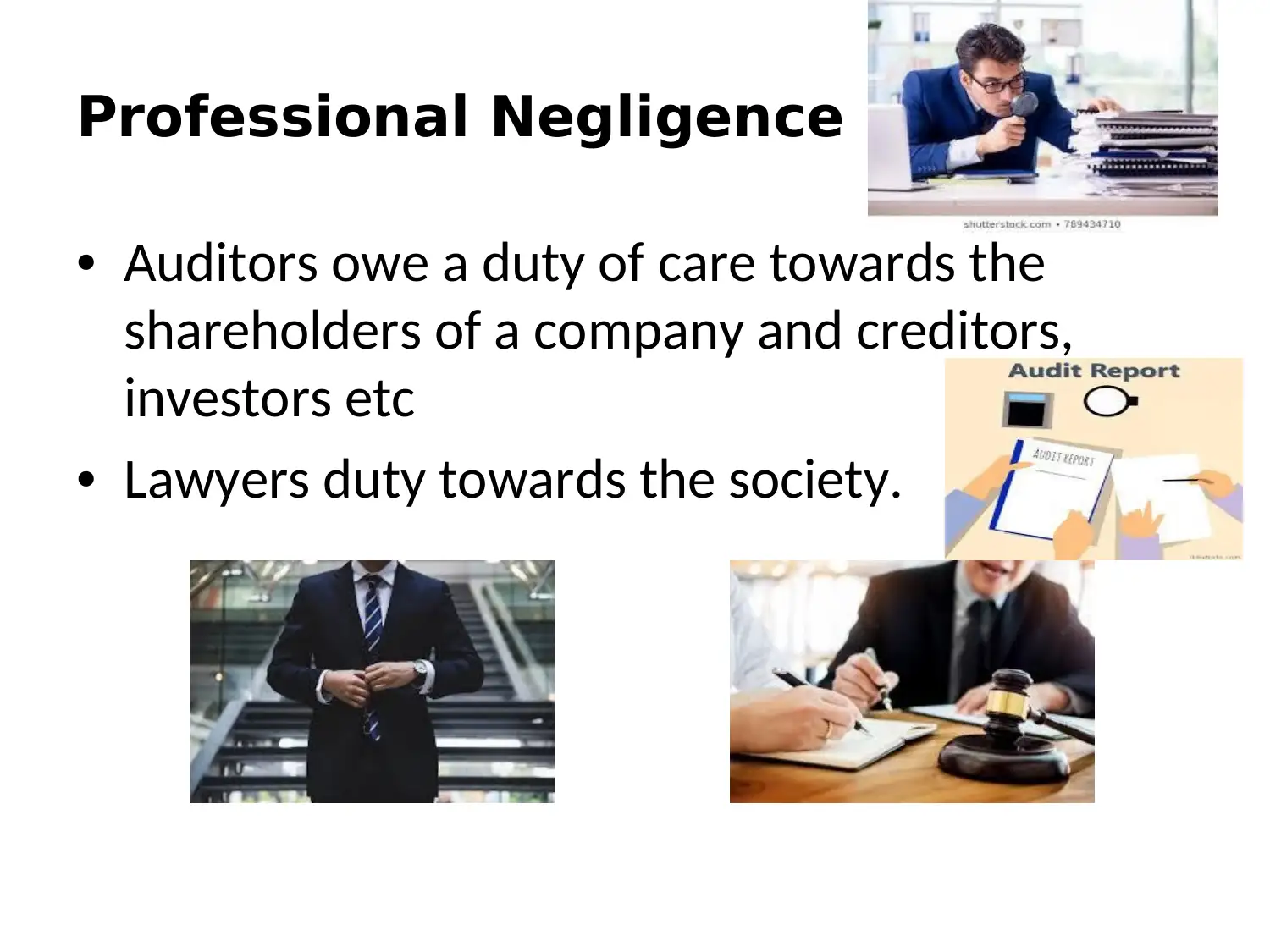
Professional Negligence
• Auditors owe a duty of care towards the
shareholders of a company and creditors,
investors etc
• Lawyers duty towards the society.
• Auditors owe a duty of care towards the
shareholders of a company and creditors,
investors etc
• Lawyers duty towards the society.
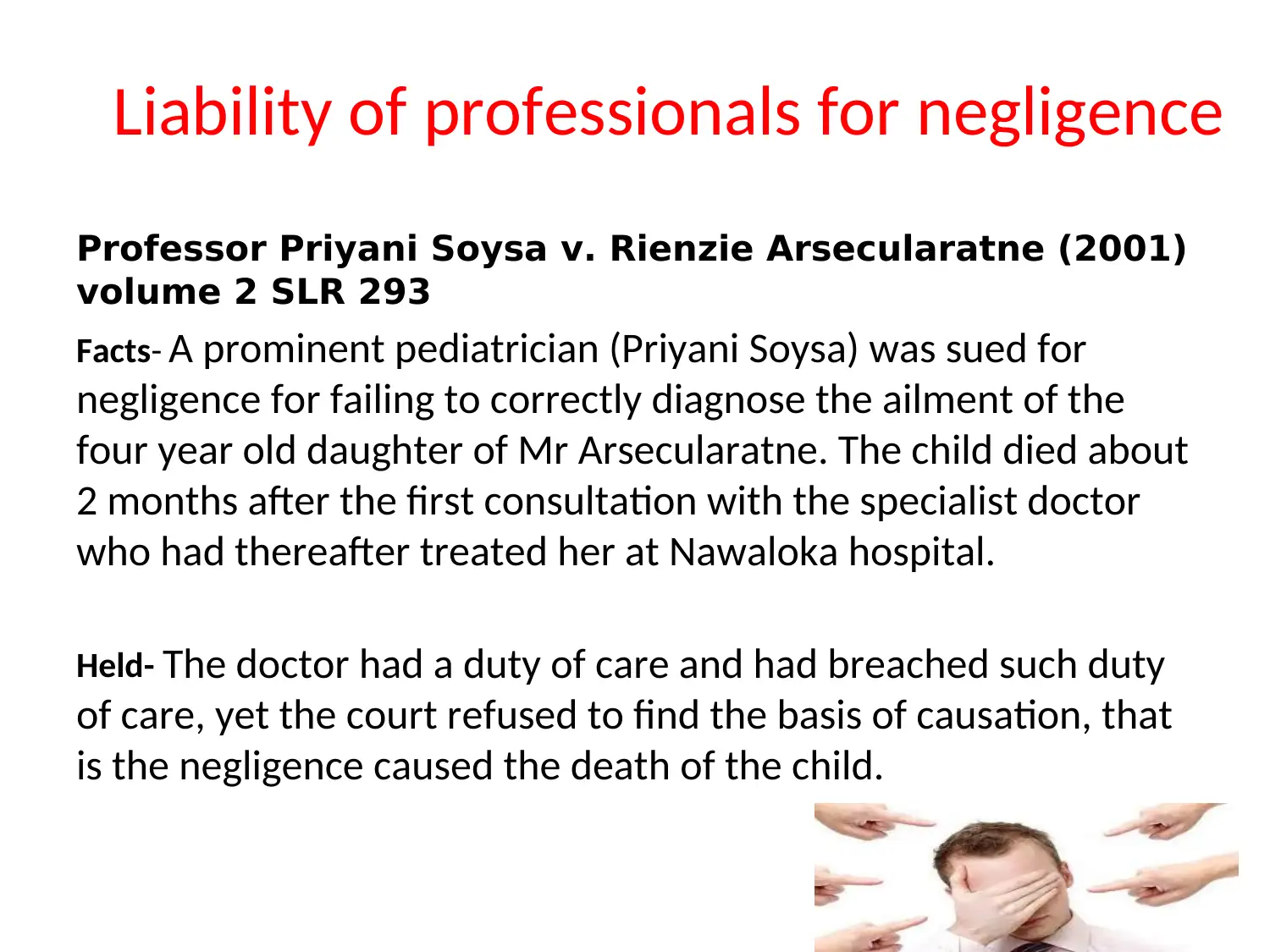
Liability of professionals for negligence
Professor Priyani Soysa v. Rienzie Arsecularatne (2001)
volume 2 SLR 293
Facts- A prominent pediatrician (Priyani Soysa) was sued for
negligence for failing to correctly diagnose the ailment of the
four year old daughter of Mr Arsecularatne. The child died about
2 months after the first consultation with the specialist doctor
who had thereafter treated her at Nawaloka hospital.
Held- The doctor had a duty of care and had breached such duty
of care, yet the court refused to find the basis of causation, that
is the negligence caused the death of the child.
Professor Priyani Soysa v. Rienzie Arsecularatne (2001)
volume 2 SLR 293
Facts- A prominent pediatrician (Priyani Soysa) was sued for
negligence for failing to correctly diagnose the ailment of the
four year old daughter of Mr Arsecularatne. The child died about
2 months after the first consultation with the specialist doctor
who had thereafter treated her at Nawaloka hospital.
Held- The doctor had a duty of care and had breached such duty
of care, yet the court refused to find the basis of causation, that
is the negligence caused the death of the child.
Secure Best Marks with AI Grader
Need help grading? Try our AI Grader for instant feedback on your assignments.
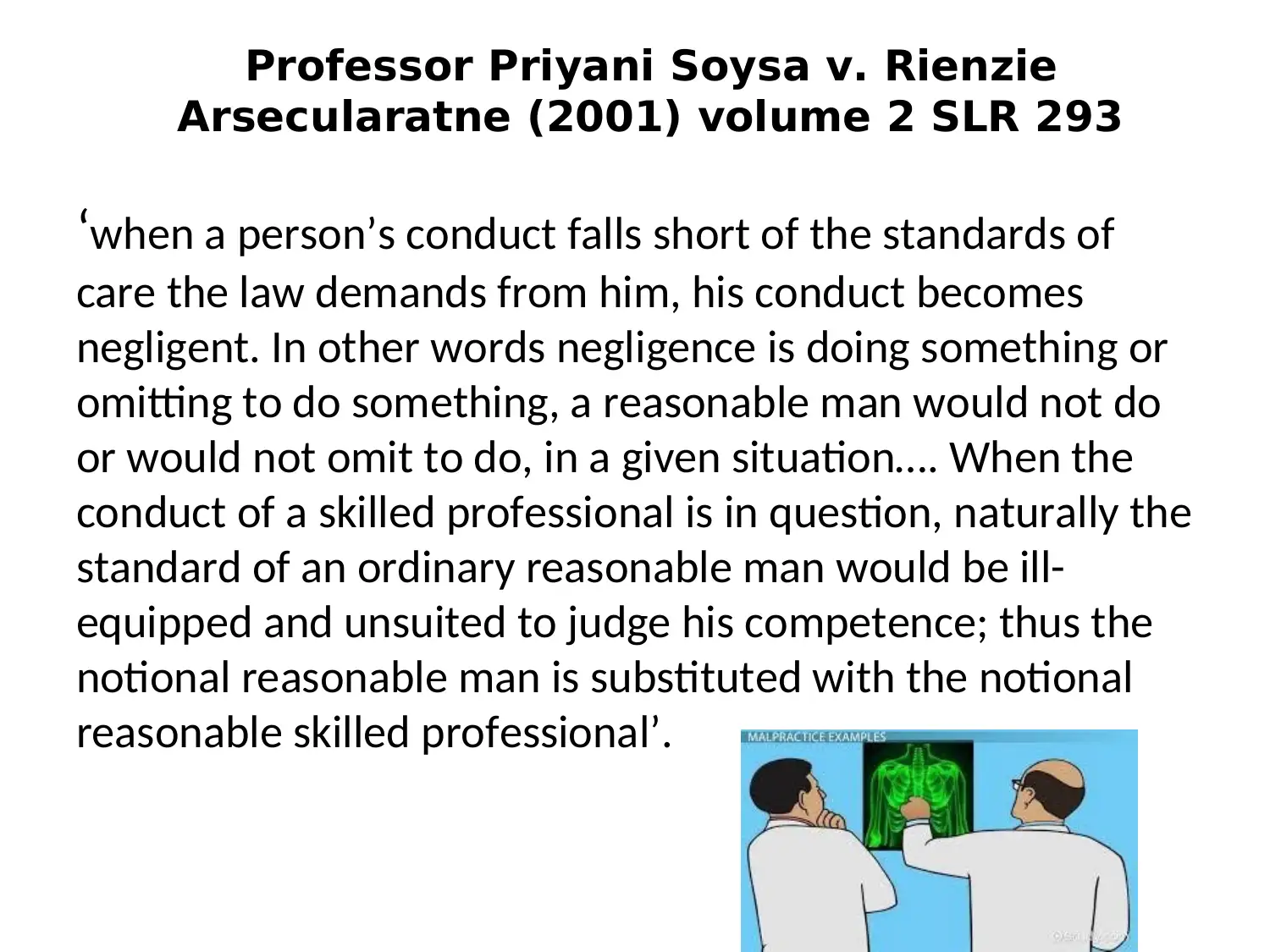
Professor Priyani Soysa v. Rienzie
Arsecularatne (2001) volume 2 SLR 293
‘when a person’s conduct falls short of the standards of
care the law demands from him, his conduct becomes
negligent. In other words negligence is doing something or
omitting to do something, a reasonable man would not do
or would not omit to do, in a given situation…. When the
conduct of a skilled professional is in question, naturally the
standard of an ordinary reasonable man would be ill-
equipped and unsuited to judge his competence; thus the
notional reasonable man is substituted with the notional
reasonable skilled professional’.
Arsecularatne (2001) volume 2 SLR 293
‘when a person’s conduct falls short of the standards of
care the law demands from him, his conduct becomes
negligent. In other words negligence is doing something or
omitting to do something, a reasonable man would not do
or would not omit to do, in a given situation…. When the
conduct of a skilled professional is in question, naturally the
standard of an ordinary reasonable man would be ill-
equipped and unsuited to judge his competence; thus the
notional reasonable man is substituted with the notional
reasonable skilled professional’.
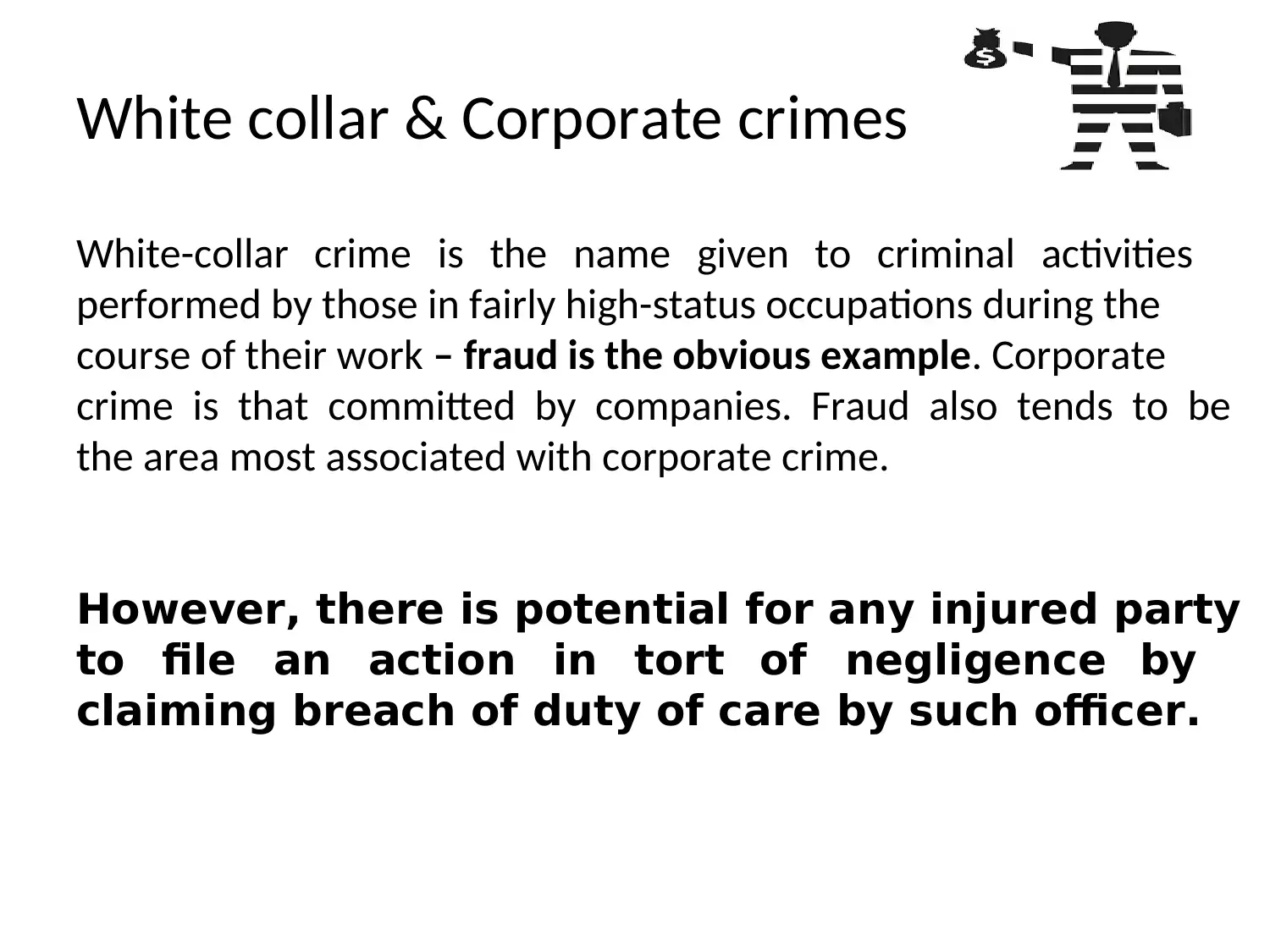
White collar & Corporate crimes
White-collar crime is the name given to criminal activities
performed by those in fairly high-status occupations during the
course of their work – fraud is the obvious example. Corporate
crime is that committed by companies. Fraud also tends to be
the area most associated with corporate crime.
However, there is potential for any injured party
to file an action in tort of negligence by
claiming breach of duty of care by such officer.
White-collar crime is the name given to criminal activities
performed by those in fairly high-status occupations during the
course of their work – fraud is the obvious example. Corporate
crime is that committed by companies. Fraud also tends to be
the area most associated with corporate crime.
However, there is potential for any injured party
to file an action in tort of negligence by
claiming breach of duty of care by such officer.
1 out of 24
Related Documents
Your All-in-One AI-Powered Toolkit for Academic Success.
+13062052269
info@desklib.com
Available 24*7 on WhatsApp / Email
![[object Object]](/_next/static/media/star-bottom.7253800d.svg)
Unlock your academic potential
© 2024 | Zucol Services PVT LTD | All rights reserved.





